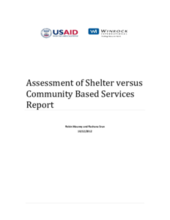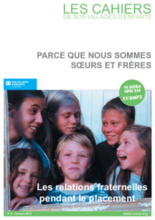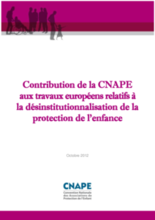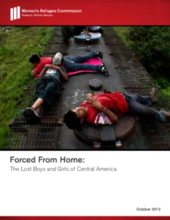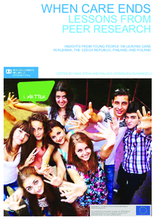Displaying 12901 - 12910 of 14563
This assessment examines shelter and community-based care models for victims of trafficking in Cambodia, and explores the best practices of service providers.
This study assesses reintegration trajectories of child soldiers in Burundi several years after demobilization. It looks broadly at socioeconomic and mental health indicators of a large group of former child soldiers and never recruited peers, both of who participated in an economic support program.
Les enfants placés ont souvent des frères et sœurs. Malgré l’importance du lien fraternel et des décisions le concernant, les recherches européennes sur les relations fraternelles sont rares et plus encore celles sur les fratries placées. Dans la plupart des pays, les données officielles disponibles renseignent sur le nombre, le sexe et l’âge des frères et sœurs dans les familles et leur statut social, mais elles ne disent rien sur les autres caractéristiques des relations fraternelles et de la situation familiale.
Apres le secteur du handicap les travaux europeens relatifs a la desinstitutionalisation portent sur le secteur de la protection de l’enfance. Aussi, la Convention Nationale des Associations de Protection de l’Enfant (CNAPE) a souhaité apporter son expertise, défendre un certain nombre de principes et présenter des axes de travail afin que l’évolution annoncée ne soit pas préjudiciable ni pour l’enfant, ni pour sa famille. La réflexion sur la désinstitutionnalisation doit être menée dans un objectif unique : offrir à chaque enfant la meilleure réponse possible au regard de sa situation et de son intérêt supérieur.
This report from the Women’s Refugee Commission describes the recent increase in migration of unaccompanied children from Central America to the United States and provides an overview of the situation of these children, including the factors that motivate their migration - primarily the violence they experience in their home countries.
This data pack, produced by the Department for Education, aims to summarize national data about children who leave care aged 16 and over and outcomes of care leavers at age 19. The pack was also developed to help local authorities to compare their performance with others and to investigate issues such as age of leaving care and placement stability on the outcomes of care leavers.
The lack of care and protection facing children is a global crisis. This paper is part of an inter-agency series originally developed to feed into the global thematic consultation for the post MDG framework: ‘Addressing Inequalities. The Heart of the Post-2015 Development Agenda and the Future We Want for All.’ It looks at the relationship between this lack of care and protection and inequality. It explores how inadequate care and protection produces and contributes to inequalities and how inequality is itself a cause of inadequate care and protection. The paper also examines the long-lasting impact of inadequate care and protection which greatly affects children’s life chances into adulthood, suggesting that inadequate care and protection is in itself a form of inequity.
Through a comprehensive statistical analysis and literature review, this UNICEF report provides a child rights-based up-to-date review of the situation of children under the age of three in formal care in the countries of Central and Eastern Europe and the Commonwealth of Independent States (CEECIS).
This report presents the findings from a two-year peer research project which includes the testimony of more than 300 young people with care experience in Albania, the Czech Republic, Finland, and Poland. More than 40 care leavers from the four countries were selected and trained to play an active role in the all aspects of the projects. The interviews revealed widespread inadequacies regarding the process of leaving care, promoting the research team to draw up recommendations to address them.


